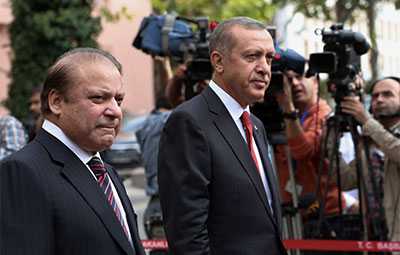
By Joel Simon/CPJ Executive Director
Prime Ministers Nawaz Sharif of Pakistan, left, and Recep Tayyip Erdogan of Turkey inspect a military honor guard in Ankara on Sept. 17. Turkey’s global influence is central to CPJ’s concerns. (AP/Burhan Ozbilici)
Turkey is hardly a press freedom paradise, but what makes the country so exciting for journalists is the amount of news it generates on any given day. The domestic story is huge, with near-daily street protests, the booming economy beginning to sag, and the prospect of regional conflict looming with Syria. And Istanbul is a base for the international press covering not only Turkey but also Syria, Iraq and Egypt.
All of this means that it is not hard to get a crowd of journalists together in Istanbul, especially if you’re buying the drinks. The talk inevitably turns to not only of what is being reported but what is not.
CPJ’s classification of Turkey as the world’s leading jailer of journalists was last year’s headline. The use of broad anti-terror laws to criminalize critical expression has long been a key component of the Turkish government strategy to suppress the Kurdish media as well as leftist and nationalist groups that it alleges are trying to topple the government.
The situation today is actually worse than it was when CPJ’s comprehensive press freedom report was issued in October 2012. In June, when street clashes over the destruction of Gezi Park morphed into broader demonstrations, journalists covering the protests became frequent targets of police abuse. During CPJ’s visit to Turkey last week, I met with one journalist, Hüseyin Gökhan Biçici, of the broadcaster IMC, who described how police detained him, ripped off his gas mask, and repeatedly beat him with clubs, focusing on his genitals.
But most mainstream journalists don’t fear being beaten or jailed. Instead, they fear losing their jobs.
The primary means of media control and manipulation involves indirect methods, such as pressure on media owners whose complex business interests depend on government support. There are widespread reports of phone calls from government advisers resulting in a particular journalist being fired or hired. The Turkish Union of Journalists reports that dozens of journalists have lost their jobs.
In an op-ed published in The New York Times, Yavuz Baydar, former ombudsperson for the daily Sabah, details how Turkey’s media conglomerates are “subverting” press freedom. This is certainly true, but it is also important to note that they are doing so under government pressure.
The combination of factors–the ongoing prosecutions, the beatings, the verbal fusillades against the international media, the indirect pressure on media owners–has created a noxious environment, in which journalists are afraid to express their views and the public is not fully informed. Turkey likes to cast itself as a model for the region and the developing world, and U.S. President Barack Obama has often held the country up as an example. CPJ’s work in Turkey is intended not only to defend Turkish journalists, but also to ensure the country’s model of media repression is not emulated elsewhere.
The Turkish government understands that its economic progress and regional influence depends in good measure on the way it is perceived internationally. That is why the government has been harshly critical of CPJ and our finding that the country jails more journalists than any other.
So, as troubling as the current environment is, we took some hope from the workaday meeting we had with Justice Ministry official Kenan Özdemir on September 16 in Ankara during which we delivered a detailed letter to Prime Minister Recep Tayyip Erdoğan laying out our concerns.
The tone was open and constructive, and, in an effort to improve communication and build confidence, we agreed to share with the Justice Ministry a list of jailed journalists we are considering for inclusion on our 2013 imprisoned list, which will be published in December. The ministry, in turn, pledged to provide its perspective on the cases. This is a normal part of our reporting process and we will, of course, take the government’s views into account when making our own independent determination.
At the meeting with the Justice Ministry, CPJ Chairman Sandra Mims Rowe, found at least one point of agreement. Turkey is important, she said, and what happens in the country matters for the region and the world. That is certainly the case when it comes to journalism, and it is why Turkey has and will continue to be a focus of CPJ’s advocacy.
Joel Simon is the executive director of the Committee to Protect Journalists. He has written widely on media issues, contributing to Slate, Columbia Journalism Review, The New York Review of Books, World Policy Journal, Asahi Shimbun, and The Times of India. He has led numerous international missions to advance press freedom. Follow him on Twitter @Joelcpj.
Contact Us
Committee to Protect Journalists
330 7th Avenue, 11th Floor
New York, NY 10001
Tel 212-465-1004
Fax 212-465-9568
